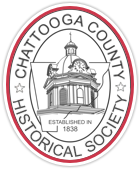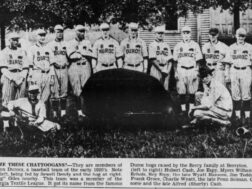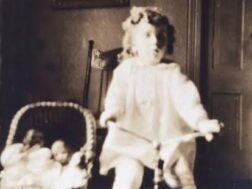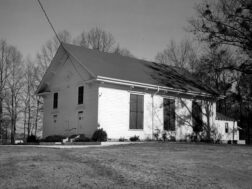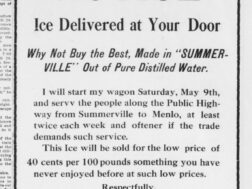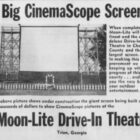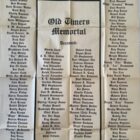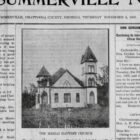Communities in Chattooga Valley
Alibi – No longer in existence, this hamlet was located about two miles northwest of Trion.
Barker’s Mills – South of Lyerly, a relatively obscure name but it appears on a 1915 map.
Berryton – Previously known as Raccoon, Berryton was named in 1910 for the owners of the cotton mill that provided a livelihood to most of its residents. While the mill is gone, Berryton still has many residents and several churches.
Chattoogaville – Located in the southern end of Chattooga County, this name is associated with the Native Americans and a community they established there long before the advent of white settlers. Early settlers included wealthy James Price, whose family would eventually help to establish Sardis Baptist Church.
Colyarton – Now defunct, Colyarton was a small community at the foot of Dirtseller Mountain.
Dickeyville – Where Pennville joins Trion, Dickeyville is not a name often heard today. Among other businesses it once boasted its own newspaper, The Dickeyville Gazette, now defunct.
Dirtseller – Named for Dirtseller Mountain, in turn named for a Native American chieftain who lived there, this neighborhood was located northwest of the present-day location of Lyerly.
Foster’s Store – Located west of Lyerly and named for the prominent farmer and storekeeper who was an early settler there.
Fowler – The name is largely unheard today but it applied for a few short years to a community just north of Foster’s Store.
Halfway – This post office was created in 1845, presumably referencing its proximity to Summerville and Lafayette, although much closer to the former. The post office was absorbed into Trion Factory in 1847.
Holland – Named for a prominent family who settled the area in the years immediately following the Civil War. It was also called Holland’s Store for a time.
Hopkinsville – Robert S. Baker’s excellent history of the county asserts that the location of Hopkinsville has not been firmly established. However, its only two postmasters were both prominent civic and business leaders in Summerville so it was most likely near the county seat. The name originated in 1837.
Island Town – Named for the original Cherokee town on the site, Island Town, like Half Way, was discontinued as a post office when Trion Factory was created. The original Island Town Native American community ran from the Trion area several miles down the Chattooga River.
Kincaid – Near the Holland Community, this hamlet bore the name of Kincaid Mountain.
Lockett – Short-lived post office that was located northeast of Trion.
Lyerly – This town was established in 1889, near the previously thriving community of Melville, which Lyerly ultimately absorbed and replaced.
Melville – Located on the west side of the Chattooga River, south of present-day Lyerly. After 40 years in existence, its post office was closed in 1889.
Pennville – A thriving community on Highway 27 north of Summerville, Pennville takes its name from the family who settled there. The William Hamm Penn family home, Penn Place, is one of the county’s few sites on the National Register of Historic Places.
Peter – A very short-lived post office, Peter was located near the Weathers home south of Holland at Sprite.
Poetry – This is a latter-day name for the oft-renamed Sprite and Tulip.
Raccoon Mills – Post office existed for 30 years, the community was eventually renamed Berryton. Both names reflect the name of the business that provided sustenance to the community.
Selma – Existed for less than one year. This writer doubts that it ever existed but was instead a typographical error of sorts in the acts of the legislature, for the county seat was being called Summerville for some time before the Summerville post office officially supplanted the name Selma in 1839.
Sling Alley – Extends south between Taliaferro and the Holland-Chattoogaville Road.
Sprite – Near and often interchangeable with Tulip, this village was a stop on the Central of Georgia railroad between Holland and Rome.
Strange – Southeast of Lyerly, area is recognized today as Taliaferro, named for Mr. John Taliaferro who had been the postmaster at Strange.
Summerville – Summerville is the county seat and was firmly established by 1839. While some have expressed the belief that Summerville’s name is in honor of its ethereal climate, most likely it was actually named by one of its most prominent early settlers and boosters, David Taylor Jr., an extremely wealthy man and early court official who had a retreat in the little community of Summerville outside of Augusta.
Taliaferro – Previously known as Strange, this place is located southeast of Lyerly and named for prominent farmer, John Taliaferro.
Trion/Trion Factory – Trion was originally known as Trion Factory and takes its name from the trio (William K. Briers, Andrew Allgood and Spencer Marsh) who founded the cotton mill along the Chattooga River. It was Mr. Allgood’s affiliation with freemasonry that saved the mill during the Civil War.
Tulip – Near and often interchangeable with Sprite, this village was a stop on the Central of Georgia railroad between Holland and Rome.
Wilson/Wilson’s Switch – Located north of Trion at the Walker County line, it was named for early residents, the Wilson family and for the train switch that was near their home on the line to Chattanooga.
